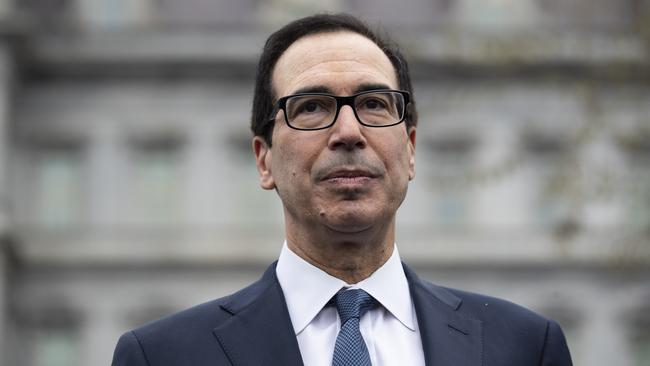US Treasury asks congress to let it backstop money market
The Treasury is asking congress to let it guarantee the $US4 trillion money-market mutual-fund industry.

The Trump administration is asking congress for authority to develop guarantee programs for the $US4 trillion ($7 trillion) money-market mutual-fund industry, as part of its broader effort to calm turmoil sparked by COVID-19.
It would require congress to suspend restrictions on the Exchange Stabilisation Fund, according to a memo viewed by The Wall Street Journal. Its use to backstop money funds during the 2008 global financial crisis contributed to a popular uproar over Wall Street bailouts and prompted congress to forbid such guarantees in the future.
If approved, the Trump administration proposal would help support actions the Fed has taken in recent weeks to calm turbulent markets. Treasury Secretary Steven Mnuchin has said the Treasury has been co-ordinating its response to the crisis with the Federal Reserve. The Fed announced on Tuesday it was creating a new program to lend to US corporations, its first effort in the current crisis that required consultation with the Treasury. The department will provide $US10bn from the Exchange Stabilisation Fund, which has about $US94bn, to cover any credit losses.
The proposed money-market program would last until the White House terminates the state of emergency President Donald Trump declared on March 13, according to the memo.
The Investment Company Institute, the trade group representing mutual funds, said in a statement that it hadn’t sought the proposal but supported it.
“This authority, even if it is not utilised, should be available to address market dislocations and protect investors,” said Paul Schott Stevens, the group’s president and CEO. But Aaron Klein, a former Obama administration Treasury official, said there was widespread agreement following the GFC that money-market funds would bear losses in the future, and post-GFC regulatory changes were meant to impress upon investors the risks they were taking.
“This sends a signal that investors in money-market mutual funds are going to get bailed out — again,” he said.
The landscape of money funds has changed dramatically since the 2008 crisis, with more money now parked in stable options that mostly hold short-term Treasury debt and other government securities. Funds that invest in riskier, short-dated commercial paper hold about $US1 trillion in assets, according to Crane Data, publisher of Money Fund Intelligence.
In 2014, the Securities and Exchange Commission approved rule changes partly intended to change investor psychology towards the funds. The riskiest ones had to adopt a floating share price, making it more apparent to investors that they could suffer losses.
Other SEC measures were meant to help money funds weather periods of turbulence, including freezing redemptions and imposing fees on investors who withdrew their cash during stressed markets. But the risk of losing access to one’s money can also speed a stampede if investors think a fund will try to limit outflows. Any government backstop would have to consider whether to guarantee funds that buy commercial debt, known as prime funds, which are allowed to freeze redemptions or impose fees on withdrawals.
Prime funds are a source of lending to corporate America, but they can stop buying debt and even sell assets when investors speed up withdrawals.
Investors pulled about $US66bn from those funds in the past week, while money has flowed into funds that hold government debt.
Mr Klein, who worked on the 2008 legislation that removed the Treasury’s authority to issue money-market guarantees, said the Exchange Stabilisation Fund was created to stabilise the value of the US dollar, not to be used for domestic purposes.
The Treasury Department is also seeking a $US200bn injection into the fund for loans to industries affected by coronavirus disruptions, including $US50bn in secured loans for the airline industry, the terms of which would include limits on executive compensation and continued service requirements, according to the memo.
The efforts may face blowback from Democrats in congress, who have called on the administration to focus first on aid to workers and small businesses.
The Wall Street Journal



To join the conversation, please log in. Don't have an account? Register
Join the conversation, you are commenting as Logout